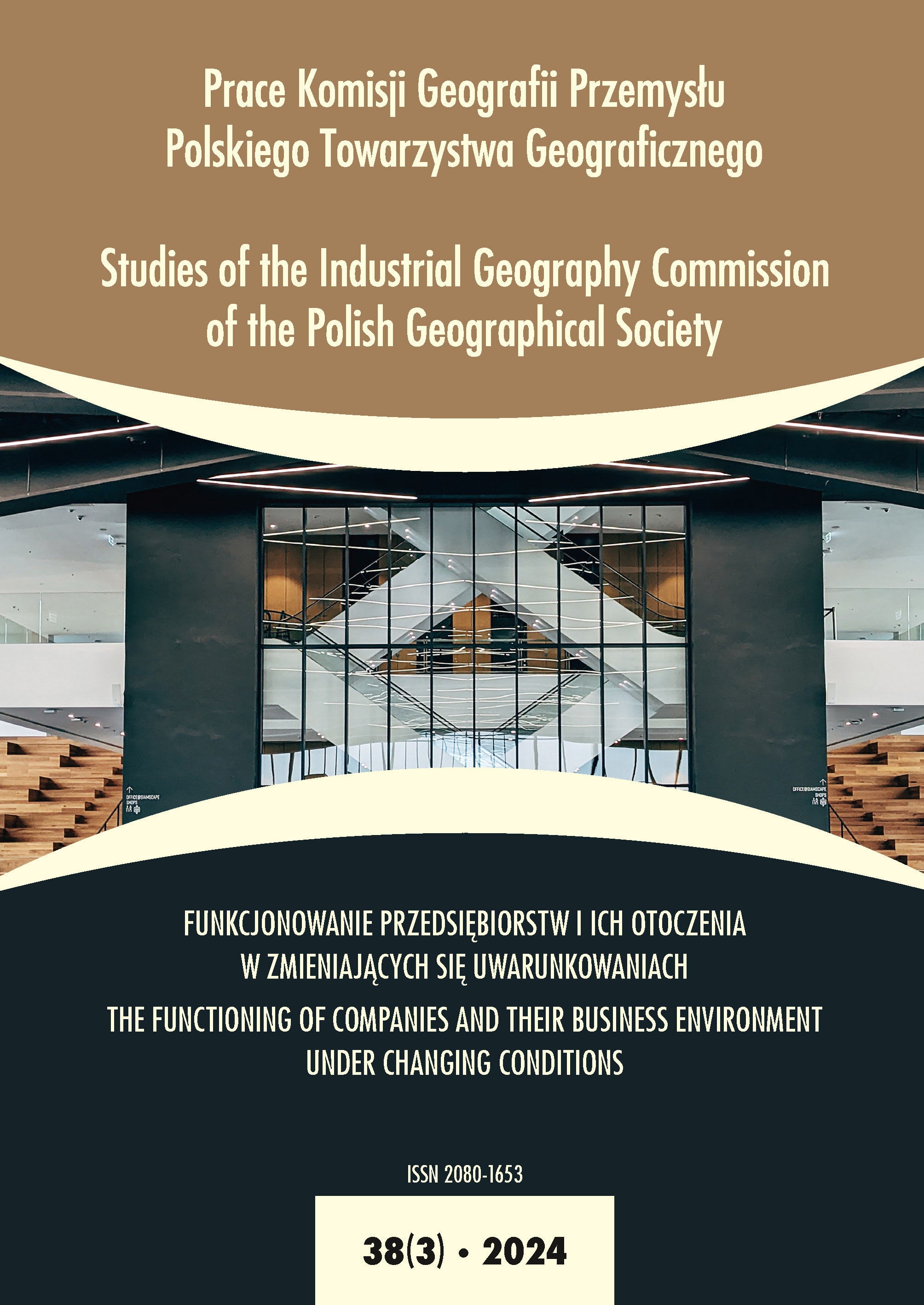Factors of satisfaction of the questing participant in the city space
DOI:
https://doi.org/10.24917/20801653.383.4Keywords:
city game, questing, tourist satisfaction, cultural tourism, urban tourismAbstract
‘Questing’ has been operating on the market for tourism services in Polish cities for two decades. The research carried out has made it possible to identify the factors influencing participant satisfaction through this method of providing access to cultural and natural heritage. Field verification has been undertaken of the presence and content of logbooks as well as a classification of the evaluations and opinions contained on the questing websites developed for Małopolska voivodeship. Comments made by tourists, visitors and residents, in the vast majority of cases positive, are mainly a result of the presence, location and form of the so‑called treasure. Questing participants also emphasised the importance of the cultural value of the area through which the route runs, the cognitive motivation to undertake this activity and the recreational walking context. The significant advice, greetings and recommendations given by those who completed the quest testifies to a sense of shared responsibility for the final quality of this innovative service. It was shown that the specificity of the comments from notebooks (logbooks), and the opinions found on the quest supervisors’ websites were different. In the former, clients are more focused on leaving a trace of their presence and contacting subsequent questing participants, rather than evaluating the quality of the quest itself, as in the case of the websites. This may provide a clue for further research on questing attractiveness and customer satisfaction factors.
Downloads
Metrics
References
Banasik, W., Fiszer, D. (2014). Gry miejskie i questing produktem turystycznym na przykładzie Warszawy. W: Z. Kruczek, W. Banasik (red.), Dynamika przemian rynku turystycznego. Warszawa: Wyższa Szkoła Turystyki i Języków Obcych, Stowarzyszenie Ekspertów Turystyki, 139–150.
Buczak, T., Zientalska, D. (2015). Badanie satysfakcji konsumentów usług turystycznych. W: E. Dziedzic (red.), Badania konsumentów usług turystycznych w regionach. Warszawa: POT, 110–138.
Clark, D., Glazer, S. (2004). Questing. A guide to creating community treasure hunts. University Press of New England, Lebanon, 27.
Crampton, J., Love, J.L. (1995). The predictive validity of alternative approaches to evaluating quality of a festival. Journal of Travel Research, 34, 1, 11–24.
Czarnecka, K. (2016). Quest, czyli edukacja przez zabawę. Próba wstępnej prezentacji gatunku. Język. Religia. Tożsamość, 1, 27–42.
Droba, G., Przepióra S. (2014). Potencjał gier miejskich i questingu jako narzędzie marketingu terytorialnego – analiza na przykładzie Rzeszowa. Modern Management Review, 19, 35–45.
Dzioban, K., Płoskonka, P., Likhtarovich, K. (2017). Edukacja leśna na terenie Kampinoskiego Parku Narodowego – opinie studentów Politechniki Warszawskiej na temat wykorzystania questu. Studia i Materiały CEPL w Rogowie, 19, 50, 45–50.
Gołoś, G. (2013). Questing i gry terenowe jako atrakcyjne rekreacyjno‑edukacyjne formy aktywności na terenach leśnych. Studia i Materiały CEPL w Rogowie, 34, 1, 76–82.
Jachnis A., Terelak, J.F. (1998). Psychologia konsumenta ireklamy. Bydgoszcz: Oficyna Wydawnicza Branta.
Jalinik, M. (2013). Questing as a modern form of tourist activity in rural areas. Economic and Regional Studies, 2, 61–64.
Kaganek, K., Kurek, A. (2016). Questing i inne formy nowoczesnego wymiaru poznawania. W: A. Stasiak, J. Śledzińska, B. Włodarczyk (red.), Współczesne oblicza krajoznawstwa. Warszawa: Wydawnictwo PTTK „Kraj”, 99–114.
Mączka, D., Kozak, A. (2017). Questing jako innowacyjny produkt turystyczny. Turystyka i Rozwój Regionalny, 7, 49–59.
Mikos von Rohrscheidt, A. (2014). Modern methods of guiding city tours. Analysis of guide’s competences and types of services. Turystyka Kulturowa, 1, 59–70.
Nowacki, M. (2013). The determinants of satisfaction of tourist atractions’ visitors. Poznań: Wydawnictwo Active.
Pawłowska, A. (2014). Questing jako innowacja w turystyce kulturowej. Turystyka Kulturowa, 1, 30–46.
Pokorna, M. (2024). Obraz funkcjonowania questingu w miastach województwa małopolskiego wynikający z opinii turystów. Praca licencjacka, IZiSS UKEN, Kraków.
Przysiężna, B., Rodziewicz, E., Kochańczyk, T. (2014). Questing jako nowa forma spędzania czasu wolnego. Rocznik Naukowy, Akademia Wychowania Fizycznego i Sportu w Gdańsku, XXIV, 113–121.
Sławińska, M., Sapała, B. (2023). Książki questingowe Beaty Sarnowskiej jako narzędzie kształtowania dziecięcej wiedzy o dziedzictwie kulturowym. Edukacja Elementarna w Teorii i Praktyce, 3, 81–95.
Smalec, A. (2015). Gry miejskie oraz questing jako formy komunikacji i kreowania wizerunku regionu. Zeszyty Naukowe Uniwersytetu Szczecińskiego, 867, 193‒205.
Tabaczyńska, M., Herbert, J. (2014). The Twins bicykle city game, and quest: „Trail of Rzeszów National Memory Places” as new forms of cycle tourism as well as physical activity promotion among inhabitants of Rzeszów. Scientific Review of Physical Culture, 4, 226–233.
Warcholik, W. (2019a). Szlaki questingowe w obszarach miejskich na przykładzie Krakowa. Annales Universitatis Paedagogicae Cracoviensis Studia Geographica, 13, 97–110.
Warcholik, W. (2019b). Questing w Małopolsce – droga do odczytania genius loci?. Turystyka Kulturowa, 6, 34–45.
Warcholik, W. (2024). Questing in urban tourism – between innovation and waste potential. Turystyka Kulturowa, 131, 32–51.
Warczyńska, A. (2016). Questing – nowe oblicze krajoznawstwa. W: A. Stasiak, J. Śledzińska, B. Włodarczyk (red.), Współczesne oblicza krajoznawstwa. Warszawa: Wydawnictwo PTTK „Kraj”, 99–114.
Widawska‑Stanisz, A. (2018). Questing in city promotion on the example of the city of Częstochowa. Innovative Marketing, 14(1), 7–12.
Wcisło, M. (2024). Wykorzystanie questingu w turystyce miejskiej w Małopolsce. Praca licencjacka, IZiSS UKEN, Kraków.
Wojcieszak, M. (2017). Innowacyjne produkty turystyczne na obszarze metropolitalnym Krakowa – próba charakterystyki. Zeszyty Naukowe Polskiego Towarzystwa Ekonomicznego w Zielonej Górze, 6, 165–178.
Zajadacz, A., Stroik, E. (2018). Satysfakcja mieszkańców Niemiec z oferty turystycznej Poznania. W: Z. Młynarczyk, A. Zajadacz (red.), Uwarunkowania i plany rozwoju turystyki. Turystyka przyrodnicza i uwarunkowania jej rozwoju, t. 22: Społeczne aspekty turystyki. Poznań: Bogucki Wydawnictwo Naukowe, 67–81.
Żyto, A. (2018). Gry turystyczne jako narzędzie promocji dziedzictwa militarnego Poznania. Turystyka Kulturowa, 126, 26–46.
Downloads
Published
How to Cite
Issue
Section
License
Copyright (c) 2024 Studies of the Industrial Geography Commission of the Polish Geographical Society

This work is licensed under a Creative Commons Attribution-NoDerivatives 4.0 International License.
Articles are published under the terms of the Creative Commons License (CC BY-ND 4.0; Attribution– NoDerivs).

